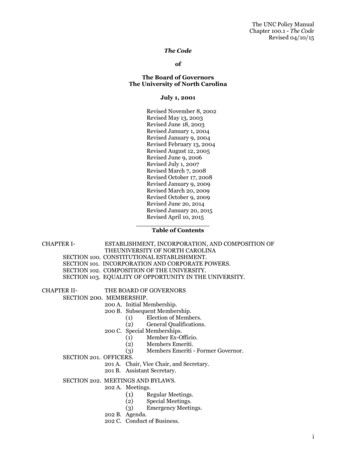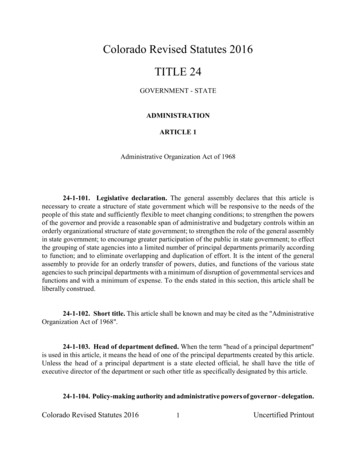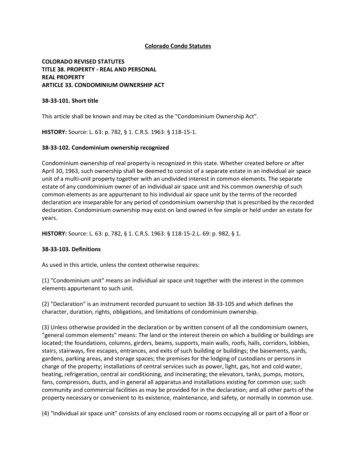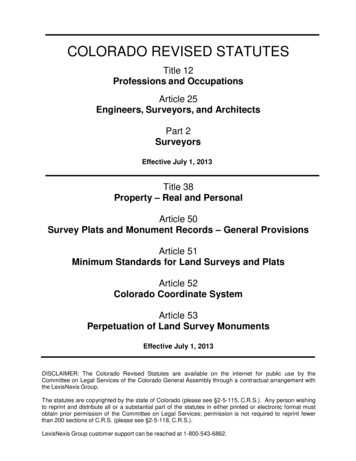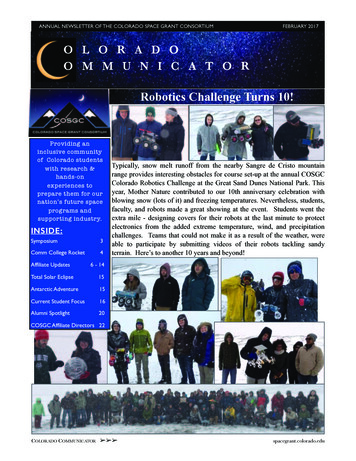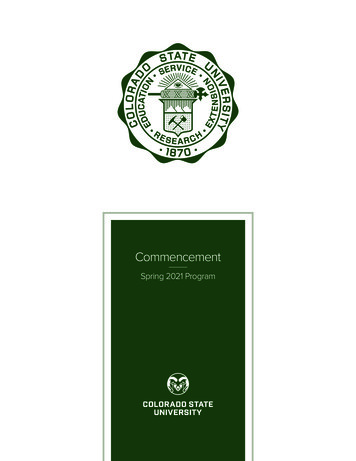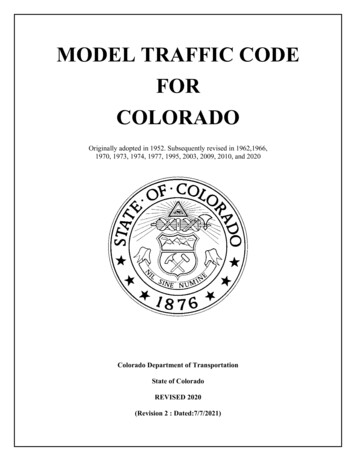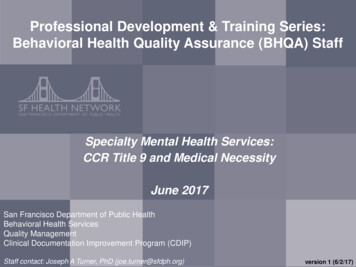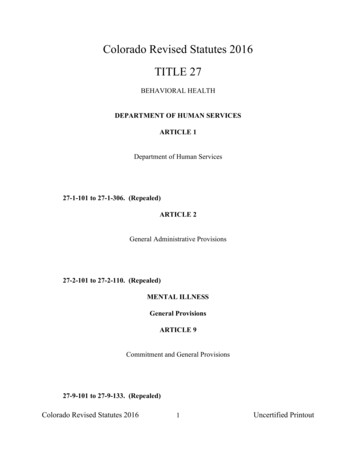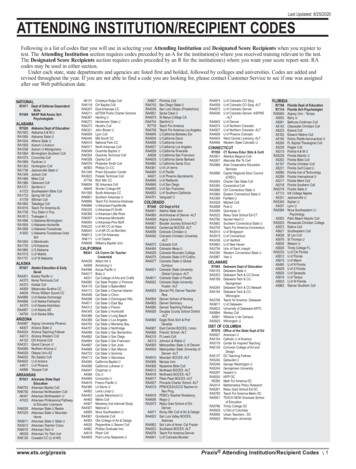
Transcription
COLORADO REVISED STATUTESTITLE 6. CONSUMER AND COMMERCIAL AFFAIRSFAIR TRADE AND RESTRAINT OF TRADEARTICLE 1. COLORADO CONSUMER PROTECTION ACTPART 1. CONSUMER PROTECTION – GENERAL6-1-105. Deceptive trade practices.(1) A person engages in a deceptive trade practice when, in the course of the person’sbusiness, vocation, or occupation, the person:***(vv) Violates section 24-21-523 (1)(f) or (1)(i) or 24-21-525 (3), (4), or (5);PART 7. SPECIFIC PROVISIONS6-1-727. Immigration-related services provided by nonattorneys - deceptive tradepractice.(1) Legislative declaration. The general assembly hereby finds and determines that thepractice by some nonattorneys of providing legal advice or services in immigration mattersnegatively impacts the people who use their services and the public interest in preventing fraudand providing adequate opportunities to pursue immigration relief. While the Colorado supremecourt regulates the practice of law in this state, the general assembly hereby finds and declaresthat it is in the public interest to prohibit nonattorneys from engaging in deceptive trade practicesin immigration services in addition to the Colorado supreme court’s prohibition against theunauthorized practice of law.(2) Definitions. As used in this section, unless the context otherwise requires:(a) “Compensation” means money, property, or anything of value.(b)(I) “Immigration matter” means a proceeding, filing, or other action that affects a person’simmigrant, nonimmigrant, or citizenship status that arises under an immigration andnaturalization law, executive order, or presidential proclamation or pursuant to an action of theUnited States citizenship and immigration services, the United States immigration and customsenforcement, the United States department of labor, the United States department of state, theUnited States department of justice, the United States department of homeland security, theboard of immigration appeals, or their successor agencies, or any other entity having jurisdictionover immigration law.(II) “Immigration matter” includes a pending or future act of congress or executive order thatconcerns immigration reform.(c) “Practice of law” has the meaning established by the Colorado supreme court, whether byrule or decision.(3) Prohibited practices - assistance with immigration matters - permitted practices.(a) A person shall not engage in the practice of law in an immigration matter forcompensation unless the person is:(I) Licensed or otherwise authorized to practice law in this state pursuant to Coloradosupreme court rules and article 93 of title 13; or(II) Authorized, under federal law, whether acting through a charitable organization orRevised 7/19/2022
otherwise, to represent others in immigration matters.(b) If a person other than a person listed in subparagraph (I) or (II) of paragraph (a) of thissubsection (3) engages in or offers to engage in one or more of the following acts or practices inan immigration matter for compensation, the person engages in a deceptive trade practice:(I) Advising or assisting another person in a determination of the person’s legal or illegalstatus for the purpose of an immigration matter;(II) For the purpose of applying for a benefit, visa, or program related to an immigrationmatter, selecting for another person, assisting another person in selecting, or advising anotherperson in selecting a benefit, visa, or program;(III) Selecting for another person, assisting another person in selecting, or advising anotherperson in selecting his or her answers on a government agency form or document related to animmigration matter;(IV) Preparing documents for, or otherwise representing the interests of, another person in ajudicial or administrative proceeding in an immigration matter;(V) Explaining, advising, or otherwise interpreting the meaning or intent of a question on agovernment agency form in an immigration matter;(VI) Demanding or accepting advance payment for the future performance of services in animmigration matter, especially with regard to services to be performed if a pending or future actof congress or executive order that concerns immigration reform is made effective; or(VII) Selecting, drafting, or completing a legal document affecting the legal rights of anotherperson in an immigration matter.(c) With or without compensation or the expectation of compensation, a person other than aperson listed in subparagraph (I) or (II) of paragraph (a) of this subsection (3) engages in adeceptive trade practice in an immigration matter if he or she represents, in any language, eitherorally or in a document, letterhead, advertisement, stationery, business card, website, or otherwritten material that he or she:(I) Is a notario publico, notario, immigration assistant, immigration consultant, immigrationspecialist, or other designation or title that conveys or implies in any language that he or shepossesses professional legal skills or expertise in the area of immigration law; or(II) Can or is willing to provide services in an immigration matter, if such services wouldconstitute the practice of law.(d) The prohibitions of subsection (3)(a) to (3)(c) of this section do not apply to the activitiesof a nonattorney assistant acting under the supervision of a person who is:(I) Licensed or otherwise authorized to practice law in this state pursuant to Coloradosupreme court rules and article 93 of title 13; or(II) Authorized, under federal law, to represent others in immigration matters.(e) Notwithstanding paragraphs (a) to (d) of this subsection (3), a person other than a personlisted in subparagraph (i) or (ii) of paragraph (a) of this subsection (3) may:(iii) Offer other immigration-related services that:(A) Are not prohibited under this subsection (3), section 24-21-523 (1)(f) or (1)(i) or 24-21525 (3), (4), or (5), or any other provision of law; and(B) Do not constitute the practice of law.TITLE 24. GOVERNMENT – STATEARTICLE 21. SECRETARY OF STATE – DEPARTMENT OF STATEPART 5. REVISED UNIFORM LAW ON NOTARIAL ACTSRevised 7/19/2022
24-21-501. Short title. The short title of this part 5 is the “Revised Uniform Law on Notarial Acts”.24-21-502. Definitions. In this part 5:(1) “Acknowledgment” means a declaration by an individual before a notarial officer that theindividual has signed a record for the purpose stated in the record and, if the record is signed in arepresentative capacity, that the individual signed the record with proper authority and signed itas the act of the individual or entity identified in the record.(1.3) “Audio-video communication” means communication by which an individual is able tosee, hear, and communicate with a remotely located individual in real time using electronic means.(1.7) “Credential” means a tangible record evidencing the identity of an individual.(2) “Electronic” means relating to technology having electrical, digital, magnetic, wireless,optical, electromagnetic, or similar capabilities.(3) “Electronic record” means a record containing information that is created, generated,sent, communicated, received, or stored by electronic means.(4) “Electronic signature” means an electronic symbol, sound, or process attached to orlogically associated with an electronic record and executed or adopted by an individual with theintent to sign the electronic record.(5) “In a representative capacity” means acting as:(a) An authorized officer, agent, partner, trustee, or other representative for a person otherthan an individual;(b) A public officer, personal representative, guardian, or other representative, in the capacitystated in a record;(c) An agent or attorney-in-fact for a principal; or(d) An authorized representative of another in any other capacity.(6) “Notarial act” means an act, whether performed with respect to a tangible or electronicrecord, that a notarial officer may perform under the law of this state. The term includes takingan acknowledgment, administering an oath or affirmation, taking a deposition or other sworntestimony, taking a verification on oath or affirmation, witnessing or attesting a signature,certifying a copy, and noting a protest of a negotiable instrument.(7) “Notarial officer” means a notary public or other individual authorized to perform anotarial act.(8) “Notary public” means an individual commissioned to perform a notarial act by thesecretary of state.(9) “Official stamp” means a physical image affixed to a tangible record or an electronicimage attached to or logically associated with an electronic record.(10) “Person” means an individual, corporation, business trust, statutory trust, estate, trust,partnership, limited liability company, association, joint venture, public corporation, governmentor governmental subdivision, agency, or instrumentality, or any other legal or commercial entity.(10.5) “Real-time” or “in real time” means, with respect to an interaction between individualsby means of audio-video communication, that the individuals can see and hear each othersubstantially simultaneously and without interruption or disconnection. Delays of a few secondsthat are inherent in the method of communication do not prevent the interaction from beingconsidered to have occurred in real time.(11) “Record” means information that is inscribed on a tangible medium or that is stored inan electronic or other medium and is retrievable in perceivable form.(11.3) “Remotely located individual” means an individual who is not in the physical presenceRevised 7/19/2022
of the notary public who performs a notarial act under this section.(11.5) “Remote notarization” means an electronic notarial act performed with respect only toan electronic record by means of real-time audio-video communication in accordance withsection 24-21-514.5 and rules adopted by the secretary of state.(11.7) “Remote notarization system” means an electronic device or process that:(a) Allows a notary public and a remotely located individual to communicate with each othersimultaneously by sight and sound; and(b) When necessary and consistent with other applicable law, facilitates communication witha remotely located individual who has a vision, hearing, or speech impairment.(12) “Sign” means, with present intent to authenticate or adopt a record:(a) To execute or adopt a tangible symbol; or(b) To attach to or logically associate with the record an electronic symbol, sound, or process.(13) “Signature” means a tangible symbol or an electronic signature that evidences thesigning of a record.(14) “Stamping device” means:(a) A physical device capable of affixing to a tangible record an official stamp; or(b) An electronic device or process capable of attaching to or logically associating with anelectronic record an official stamp.(15) “State” means a state of the United States, the District of Columbia, Puerto Rico, theUnited States Virgin Islands, or any territory or insular possession subject to the jurisdiction ofthe United States.(15.5) “Tamper-evident” means the use of a set of applications, programs, hardware, software,or other technologies that will display evidence of any changes made to an electronic record.(16) “Verification on oath or affirmation” means a declaration, made by an individual onoath or affirmation before a notarial officer, that a statement in a record is true.24-21-503. Applicability. This part 5 applies to a notarial act performed on or after the effectivedate of this part 5.24-21-504. Authority to perform notarial act. (1) A notarial officer may perform a notarial actauthorized by this part 5 or by law of this state other than this part 5.(2) A notarial officer shall not perform a notarial act with respect to a record in which theofficer has a disqualifying interest. For the purposes of this section, a notarial officer has adisqualifying interest in a record if:(a) The officer or the officer’s spouse, partner in a civil union, ancestor, descendent, orsibling is a party to or is named in the record that is to be notarized; or(b) The officer or the officer’s spouse or partner in a civil union may receive directly, and asa proximate result of the notarization, any advantage, right, title, interest, cash, or propertyexceeding in value the sum of any fee properly received in accordance with this part 5.(3) A notarial act performed in violation of this section is voidable.24-21-505. Requirements for certain notarial acts. (1) A notarial officer who takes anacknowledgment of a record shall determine, from personal knowledge or satisfactory evidenceof the identity of the individual, that the individual appearing before the officer and making theacknowledgment has the identity claimed and that the signature on the record is the signature ofthe individual.Revised 7/19/2022
(2) A notarial officer who takes a verification of a statement on oath or affirmation shalldetermine, from personal knowledge or satisfactory evidence of the identity of the individual,that the individual appearing before the officer and making the verification has the identityclaimed and that the signature on the statement verified is the signature of the individual.(3) A notarial officer who witnesses or attests to a signature shall determine, from personalknowledge or satisfactory evidence of the identity of the individual, that the individual appearingbefore the officer and signing the record has the identity claimed.(4)(a) A notarial officer who certifies a copy of a record or an item that was copied shalldetermine that the copy is a full, true, and accurate transcription or reproduction of the record oritem.(b) A notarial officer shall not certify a copy of a record that can be obtained from any of thefollowing offices in this state:(i) A clerk and recorder of public documents;(ii) The secretary of state;(iii) The state archives; or(iv) An office of vital records.(c) A notarial officer shall not certify a copy of a record if the record states on its face that itis illegal to copy the record.(5)(a) A notarial officer who makes or notes a protest of a negotiable instrument shalldetermine the matters set forth in section 4-3-505 (b) of the “uniform commercial code”.(b) A notary public shall not make or note a protest of a negotiable instrument unless thenotary is an employee of a financial institution acting in the course and scope of the notary’semployment with the financial institution.24-21-506. Personal appearance required. (1) If a notarial act relates to a statement made in ora signature executed on a record, the individual making the statement or executing the signatureshall appear personally before the notarial officer.(2) As used in this section, “appear personally” means:(a) Being in the same physical location as another individual and close enough to see, hear,communicate with, and exchange tangible identification credentials with that individual; or(b) Interacting with a remotely located individual by means of real-time audio-videocommunication in compliance with section 24-21-514.5 and rules adopted by the secretary of state.24-21-507. Identification of individual. (1) A notarial officer has personal knowledge of theidentity of an individual appearing before the officer if the individual is personally known to theofficer through dealings sufficient to provide reasonable certainty that the individual has theidentity claimed.(2) A notarial officer has satisfactory evidence of the identity of an individual appearingbefore the officer if the officer can identify the individual:(a) By means of:(i) A passport, driver’s license, or government-issued nondriver identification card that iscurrent or expired not more than one year before performance of the notarial act; or(ii) Another form of government identification issued to the individual that is current orexpired not more than one year before performance of the notarial act, contains the signature or aphotograph of the individual, and is satisfactory to the officer; or(b) By a verification on oath or affirmation of a credible witness personally appearing beforeRevised 7/19/2022
the officer and known to the officer or whom the officer can identify on the basis of a passport,driver’s license, or government-issued nondriver identification card that is current or expired notmore than one year before performance of the notarial act.(3) A notarial officer may require an individual to provide additional information oridentification credentials necessary to assure the officer of the identity of the individual.24-21-508. Authority to refuse to perform notarial act. (1) A notarial officer may refuse toperform a notarial act if the officer is not satisfied that:(a) The individual executing the record is competent or has the capacity to execute therecord; or(b) The individual’s signature is knowingly and voluntarily made.(2) A notarial officer may refuse to perform a notarial act unless refusal is prohibited by lawother than this part 5.24-21-509. Signature if individual unable to sign. (1) If an individual is physically unableto sign a record, the individual may, in the presence of the notarial officer, direct an individualother than the notarial officer to sign the individual’s name on the record. The notarial officershall insert “signature affixed by (name of other individual) at the direction of (name ofindividual)” or words of similar import under or near the signature.(2) A notary public may use signals or electronic or mechanical means to take anacknowledgment from, administer an oath or affirmation to, or otherwise communicate with anyindividual in the presence of the notary public when it appears that the individual is unable tocommunicate verbally or in writing.24-21-510. Notarial act in this state. (1) A notarial act may be performed in this state by:(a) A notary public of this state;(b) A judge, clerk, or deputy clerk of a court of this state; or(c) Any other individual authorized to perform the specific act by the law of this state.(2) The signature and title of an individual performing a notarial act in this state are primafacie evidence that the signature is genuine and that the individual holds the designated title.(3) The signature and title of a notarial officer described in subsection (1)(a) or (1)(b) of thissection conclusively establish the authority of the officer to perform the notarial act.24-21-511. Notarial act in another state. (1) A notarial act performed in another state has thesame effect under the law of this state as if performed by a notarial officer of this state if the actperformed in that state is performed by:(a) A notary public of that state;(b) A judge, clerk, or deputy clerk of a court of that state; or(c) Any other individual authorized by the law of that state to perform the notarial act.(2) The signature and title of an individual performing a notarial act in another state are primafacie evidence that the signature is genuine and that the individual holds the designated title.(3) The signature and title of a notarial officer described in subsection (1)(a) or (1)(b) of thissection conclusively establish the authority of the officer to perform the notarial act.24-21-512. Notarial act under authority of federally recognized Indian tribe. (1) A notarialact performed under the authority and in the jurisdiction of a federally recognized Indian tribeRevised 7/19/2022
has the same effect as if performed by a notarial officer of this state if the act performed in thejurisdiction of the tribe is performed by:(a) A notary public of the tribe;(b) A judge, clerk, or deputy clerk of a court of the tribe; or(c) Any other individual authorized by the law of the tribe to perform the notarial act.(2) The signature and title of an individual performing a notarial act under the authority ofand in the jurisdiction of a federally recognized Indian tribe are prima facie evidence that thesignature is genuine and that the individual holds the designated title.(3) The signature and title of a notarial officer described in subsection (1)(a) or (1)(b) of thissection conclusively establish the authority of the officer to perform the notarial act.24-21-513. Notarial act under federal authority. (1) A notarial act performed under federallaw has the same effect under the law of this state as if performed by a notarial officer of thisstate if the act performed under federal law is performed by:(a) A judge, clerk, or deputy clerk of a court;(b) An individual in military service or performing duties under the authority of militaryservice who is authorized to perform notarial acts under federal law;(c) An individual designated a notarizing officer by the united states department of state forperforming notarial acts overseas; or(d) Any other individual authorized by federal law to perform the notarial act.(2) The signature and title of an individual acting under federal authority and performing anotarial act are prima facie evidence that the signature is genuine and that the individual holdsthe designated title.(3) The signature and title of an officer described in subsection (1)(a), (1)(b), or (1)(c) of thissection conclusively establish the authority of the officer to perform the notarial act.24-21-514. Foreign notarial act. (1) In this section, “foreign state” means a government otherthan the united states, a state, or a federally recognized Indian tribe.(2) If a notarial act is performed under authority and in the jurisdiction of a foreign state orconstituent unit of the foreign state or is performed under the authority of a multinational orinternational governmental organization, the act has the same effect under the law of this state asif performed by a notarial officer of this state.(3) If the title of office and indication of authority to perform notarial acts in a foreign stateappears in a digest of foreign law or in a list customarily used as a source for that information,the authority of an officer with that title to perform notarial acts is conclusively established.(4) The signature and official stamp of an individual holding an office described insubsection (3) of this section are prima facie evidence that the signature is genuine and theindividual holds the designated title.(5) An apostille in the form prescribed by the Hague Convention of October 5, 1961, andissued by a foreign state party to the convention conclusively establishes that the signature of thenotarial officer is genuine and that the officer holds the indicated office.(6) A consular authentication issued by an individual designated by the United StatesDepartment of State as a notarizing officer for performing notarial acts overseas and attached tothe record with respect to which the notarial act is performed conclusively establishes that thesignature of the notarial officer is genuine and that the officer holds the indicated office.Revised 7/19/2022
24-21-514.5. Audio-video communication - definitions(1) As used in this section:(a) “Credential analysis” means a process or service that complies with any rules adopted bythe secretary of state through which a third party affirms the validity of a government-issuedidentification credential through the review of public or proprietary data sources.(b) “Dynamic, knowledge-based authentication assessment” means an identity assessmentthat is based on a set of questions formulated from public or private data sources for which theremotely located individual taking the assessment has not previously provided an answer andthat meets any rules adopted by the secretary of state.(c) “Outside the United States” means a location outside the geographic boundaries of theUnited States, Puerto Rico, the United States Virgin Islands, and any territory or insularpossession subject to the jurisdiction of the United States.(d) “Public key certificate” means an electronic credential that is used to identify a remotelylocated individual who signed an electronic record with the credential.(e) “Remote presentation” means transmission to the notary public through communicationtechnology of an image of a government-issued identification credential that is of sufficientquality to enable the notary public to:(I) Identify the remotely located individual seeking the notary public’s services; and(II) Perform credential analysis.(2) (a) Except as provided in subsection (2)(b) of this section, a notary public may perform aremote notarization only with respect to an electronic record and in compliance with this sectionand any rules adopted by the secretary of state for a remotely located individual who is located:(I) In this state;(II) Outside of this state but within the United States; or(III) Outside the United States if:(A) The notary public has no actual knowledge that the notarial act is prohibited in thejurisdiction in which the remotely located individual is physically located at the time of the act;and(B) The remotely located individual confirms to the notary public that the requested notarialact and the record relate to: A matter that will be filed with or is currently before a court,governmental entity, or other entity in the United States; property located in the United States; ora transaction substantially connected to the United States.(b) A notary public shall not use a remote notarization system to notarize:(I) A record relating to the electoral process; or(II) Except as provided in the “Colorado Uniform Electronic Wills Act”, Part 15 of Article 12of Title 15, a will, codicil, document purporting to be a will or codicil, or any acknowledgmentrequired under section 15-11-502 or 15-11-504.(3) Before a notary public performs the notary public’s initial notarization using a remotenotarization system, the notary public shall notify the secretary of state that the notary public willbe performing remote notarizations and shall identify each remote notarization system that thenotary public intends to use. The remote notarization system must conform to this part 5 and anyrules adopted by the secretary of state. The notice must be submitted in the format required bythe secretary of state and must:(a) Include an affirmation that the notary public has read and will comply with this sectionand all rules adopted by the secretary of state; and(b) Be accompanied by proof that the notary public has successfully completed any trainingRevised 7/19/2022
and examination required by the secretary of state.(4) A notary public who performs a notarial act for a remotely located individual by means ofaudio-video communication must:(a) Be located within this state at the time the notarial act is performed;(b) Execute the notarial act in a single, real-time session;(c) Confirm that any record that is signed, acknowledged, or otherwise presented fornotarization by the remotely located individual is the same record signed by the notary public;(d) Confirm that the quality of the audio-video communication is sufficient to make thedeterminations required for the notarial act under this part 5 and any other law of this state; and(e) Identify the venue for the notarial act as the jurisdiction within the state of Coloradowhere the notary public is physically located while performing the act.(5) A remote notarization system used to perform remote notarizations must:(a) Require the notary public, the remotely located individual, and any required witness toaccess the system through an authentication procedure that complies with rules adopted by thesecretary of state regarding security and access;(b) Enable the notary public to verify the identity of the remotely located individual and anyrequired witness by means of personal knowledge or satisfactory evidence of identity incompliance with subsection (6) of this section; and(c) Confirm that the notary public, the remotely located individual, and any required witnessare viewing the same record and that all signatures, changes, and attachments to the record aremade in real time.(6) (a) A notary public shall determine from personal knowledge or satisfactory evidence ofidentity as described in subsection (6)(b) of this section that the remotely located individualappearing before the notary public by means of audio-video communication is the individual thathe or she purports to be.(b) A notary public has satisfactory evidence of identity if the notary public can identify theremotely located individual who personally appears before the notary public by means of audiovideo communication by using at least one of the following methods:(I) The oath or affirmation of a credible witness who personally knows the remotely locatedindividual, is personally known to the notary public, and is in the physical presence of the notarypublic or the remotely located individual during the remote notarization;(II) Remote presentation and credential analysis of a government-issued identificationcredential, and the data contained on the credential, that contains the signature and a photographof the remotely located individual, and at least one of the following:(A) A dynamic, knowledge-based authentication assessment by a trusted third party thatcomplies with rules adopted by the secretary of state;(B) A valid public key certificate that complies with rules adopted by the secretary of state; or(C) An identity verification by a trusted third party that complies with rules adopted by thesecretary of state; or(III) Any other method that complies with rules adopted by the secretary of state.(7) Without limiting the authority of a notary public under section 24-21-508 to refuse toperform a notarial act, a notary public may refuse to perform a notarial act under this section ifthe notary public is not satisfied that the requirements of this section are met.(8) The certificate of notarial act for a remote notarization must, in addition to complyingwith the requirements of section 24-21-515, indicate that the notarial act was performed usingaudio-video communication technology.Revised 7/19/2022
(9) (a) A notary public shall creat
TITLE 6. CONSUMER AND COMMERCIAL AFFAIRS FAIR TRADE AND RESTRAINT OF TRADE ARTICLE 1. COLORADO CONSUMER PROTECTION ACT PART 1. CONSUMER PROTECTION - GENERAL 6-1-105. Deceptive trade practices. (1) A person engages in a deceptive trade practice when, in the course of the person's business, vocation, or occupation, the person: ***
